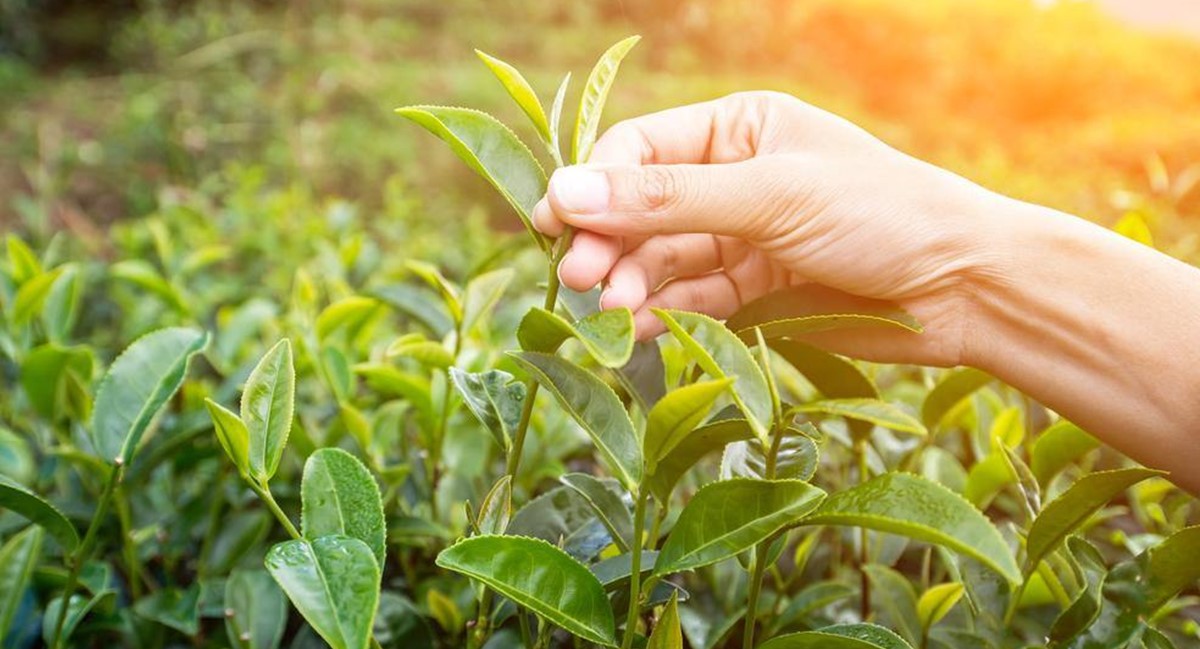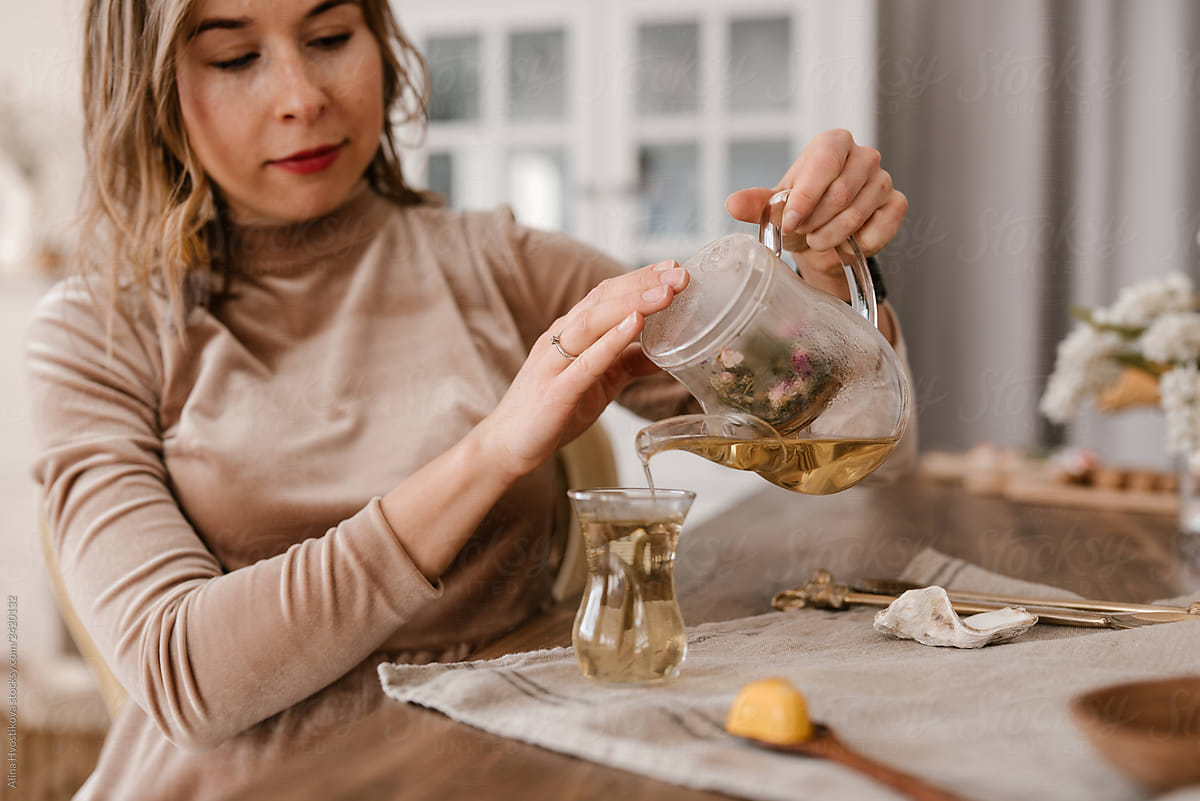Herbal teas, often referred to as “nature’s remedies,” have been cherished for centuries for their various health benefits and soothing properties. These delightful brews are made by infusing various parts of plants, such as leaves, flowers, roots and stems in hot water. From aiding digestion to promoting relaxation, herbal teas offer a diverse range of benefits that can enhance your overall well-being.
Understanding Herbal Tea and Its Origins
When we talk about herbal teas, we’re stepping into a world of natural remedies and ancient traditions that have stood the test of time. Unlike traditional tea, which is derived from the Camellia sinensis plant, herbal tea is a diverse collection of infusions made from various parts of different plants. These plants can include leaves, flowers, roots, stems, and even spices, all infused in hot water to create a beverage that’s not only flavorful but also brimming with health benefits. Let’s take a deeper dive into the fascinating world of herbal teas and explore their origins and significance.
A Botanical Exploration

The history of herbal teas is intertwined with cultures and civilizations that span the globe. From the valleys of China to the deserts of Egypt, herbal teas have been a part of traditional medicine and daily rituals for centuries. The use of herbs for their medicinal properties predates modern pharmaceuticals, and these practices have been passed down through generations, fostering a rich tapestry of knowledge about the healing properties of plants.
Ancient Wisdom and Holistic Practices
Traditional systems of medicine, such as Traditional Chinese Medicine (TCM) and Ayurveda, have played a significant role in shaping the use of herbal teas for health and wellness. In TCM, for example, herbal teas are often formulated to restore balance within the body’s energy systems, known as qi. In Ayurveda, herbs are carefully selected to align with an individual’s dosha, or constitution, to promote harmony and well-being. These ancient systems emphasize the interconnectedness of the body, mind, and nature – a philosophy that continues to resonate with many people seeking holistic health approaches today.
Herbal Teas and Their Benefits
Each type of herbal tea comes with its own unique set of benefits, thanks to the diverse array of plant materials used. Chamomile, with its delicate flowers, has been celebrated for its calming and digestive properties for centuries. Peppermint, an invigorating herb, can help soothe an upset stomach and relieve headaches. Rooibos, a caffeine-free infusion from South Africa, is praised for its antioxidant content and potential anti-inflammatory effects. With a world of options to choose from, there’s an herbal tea for practically every wellness need.
Modern Resurgence and Scientific Validation
In recent years, there has been a resurgence of interest in herbal teas, driven by a growing desire for natural and holistic health solutions. While ancient wisdom has long recognized the benefits of these teas, modern scientific research is now catching up, providing evidence to support what traditional practices have long known. Studies have explored the bioactive compounds present in various herbs, shedding light on their potential to improve digestion, reduce inflammation, support the immune system, and more.
Brewing a Cup of Nature’s Wisdom

Brewing herbal tea is not just about extracting flavor; it’s about unlocking the healing potential within these plants. As you pour hot water over the herbs and watch as their colors and aromas infuse the water, you’re engaging in a centuries-old ritual that connects you to the earth’s bounty. The act of sipping herbal tea can be a form of mindfulness, allowing you to pause and appreciate the moment while reaping the benefits of the herbs’ therapeutic properties.
The Health Benefits of Herbal Teas
- Soothing Digestive Aid: Herbal teas are renowned for their ability to calm and support the digestive system. Peppermint tea, for instance, can help alleviate indigestion, bloating, and gas. Ginger tea, another popular choice, is known to relieve nausea and promote better digestion. The warm liquid and the natural compounds in these teas work together to ease discomfort and promote a healthy gut.
- Relaxation and Stress Relief: In our fast-paced world, finding moments of relaxation is essential for maintaining a balanced lifestyle. Chamomile tea, with its mild sedative properties, is often sipped before bedtime to induce a sense of calm and aid in sleep. Lavender tea, known for its soothing aroma, can also help alleviate stress and anxiety. The act of brewing and sipping herbal tea itself can be a calming ritual, providing a moment of mindfulness in our daily routine.
- Immune System Boost: Certain herbal teas possess immune-boosting properties that can help your body defend against illnesses. Echinacea tea, derived from the purple coneflower, is believed to stimulate the immune system and reduce the duration of colds. Elderberry tea is rich in antioxidants and has been traditionally used to support the immune system’s functioning. These teas can be particularly beneficial during the colder months when our immune systems may need an extra boost.
- Anti-Inflammatory Effects: Chronic inflammation has been linked to various health issues, including heart disease and arthritis. Herbal teas like turmeric tea and green tea are known for their anti-inflammatory properties. Turmeric contains curcumin, a powerful compound with natural anti-inflammatory effects. Green tea, although made from the Camellia sinensis plant, is included here due to its well-documented health benefits, which include reducing inflammation and promoting overall wellness.
- Detoxification Support: Supporting our body’s natural detoxification processes is essential for maintaining optimal health. Dandelion root tea is often hailed as a natural detoxifier, aiding the liver in eliminating toxins from the body. Nettle tea is also known to have diuretic properties that can help flush out excess fluids and toxins. Incorporating these herbal teas into your routine can contribute to a healthier and more vibrant you.
Brewing and Enjoying Herbal Teas
Brewing and enjoying herbal teas is not just a culinary exercise; it’s a mindful ritual that connects us to the soothing power of nature. Whether you’re seeking a moment of relaxation, a boost to your immunity, or relief from a specific ailment, the art of brewing herbal teas can be a therapeutic and fulfilling practice. Let’s delve into the process of brewing herbal teas, from selecting the right herbs to savoring each sip, and discover how this simple act can elevate your well-being.
Selecting Your Herbal Blend
The first step in crafting a perfect cup of herbal tea is choosing the right blend of herbs. Depending on your intention – be it relaxation, digestion support, or a boost to your immune system – you’ll want to select herbs that align with your goals. If you’re new to herbal teas, consider starting with single-ingredient blends like chamomile, peppermint, or lavender. As you become more familiar with their flavors and effects, you can experiment with more complex blends that combine multiple herbs for a synergistic impact.
Measuring and Infusing
Once you’ve chosen your herbs, it’s time to measure out the right amount. As a general rule, a teaspoon of dried herbs per cup of water is a good starting point. However, feel free to adjust the quantity based on your personal taste preferences. Boil fresh, filtered water and pour it over the herbs in a cup or teapot. Cover the vessel to trap the steam and essential oils, which will help preserve the flavors and therapeutic properties of the herbs.
The Art of Steeping
The steeping time is crucial in extracting the maximum flavor and benefits from your herbal blend. Most herbal teas require 5 to 10 minutes of steeping time, but this can vary based on the type of herbs you’re using. Delicate flowers and leaves, like chamomile and mint, tend to release their essence quickly, while tougher roots and barks may need a bit more time to fully infuse the water. Refer to the recommended steeping times on the packaging or in your recipe, and consider using an infuser or strainer to make the process easier.
Creating a Ritual of Savoring
As you wait for your herbal tea to steep, take a moment to create a serene atmosphere that enhances the experience. Find a cozy spot where you can relax without distractions. Consider dimming the lights, playing calming music, or simply enjoying the tranquility of the moment. When the steeping time is up, inhale the aromatic steam rising from your cup – this is the first introduction to the flavors and aromas that await you.
Sipping Mindfully
Sipping herbal tea is an act of mindfulness, a chance to be fully present and engage with your senses. Take a small sip and let the warm liquid coat your tongue. Pay attention to the flavors that unfold – the delicate sweetness of chamomile, the invigorating kick of ginger, or the earthy richness of nettle. Feel the soothing warmth as it travels down your throat, and notice any sensations or emotions that arise. Herbal teas have the power to evoke memories, comfort, and relaxation, so allow yourself to fully immerse in the experience.
Customizing Your Brew
One of the beauties of brewing herbal teas is the ability to customize your brew according to your preferences. If you find a particular blend too strong, you can dilute it with a bit more hot water. To add depth to your brew, consider incorporating natural sweeteners like honey or a splash of citrus juice. As you become more experienced, you might even venture into blending your own herbal combinations, tailoring them to your unique needs and taste preferences.
Listening to Your Body
As you savor your cup of herbal tea, pay attention to how your body responds. Do you feel a sense of calm? Is your stomach more settled? Are you experiencing a moment of clarity? The beauty of herbal teas lies in their holistic approach to wellness – they not only offer physical benefits but also create an opportunity for self-awareness and self-care.
Brewing herbal tea is a simple and enjoyable process. To fully extract the beneficial compounds, follow these steps:
- Boil water and pour it over the herbs in a cup or teapot.
- Cover and steep for the recommended time (usually 5-10 minutes).
- Strain the herbs and enjoy your aromatic and flavorful herbal tea.
Remember that the potency and benefits of herbal teas may vary, so it’s always a good idea to consult with a healthcare professional before incorporating them into your routine, especially if you have specific health concerns or are on medication.
Conclusion
Herbal teas are much more than just comforting beverages – they are nature’s remedies, offering a plethora of healing benefits for our bodies and minds. From promoting digestion to aiding relaxation and boosting immunity, these teas have been cherished for generations for their therapeutic effects. Whether you’re seeking relief from a specific ailment or simply looking to enhance your well-being, there’s an herbal tea out there waiting to become your new favorite brew. So why not embrace the healing power of herbal teas and let nature’s remedies nurture you from the inside out?









